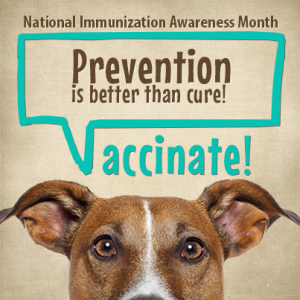Posts Tagged ‘rabies’
FAQ’s About Pet Vaccinations
 Vaccinations are part of a basic pet wellness program that the Olsen Veterinary Clinic administers in Glen Carbon and the surrounding area. If you are not familiar with veterinary concerns or have never owned a pet up to this point, it is understandable that you might not know exactly what the pet vaccinations can do to safeguard your pet’s health. As August has been designated National Immunization Awareness Month, here are some frequently asked questions we get from pet owners regarding dog and cat vaccinations.
Vaccinations are part of a basic pet wellness program that the Olsen Veterinary Clinic administers in Glen Carbon and the surrounding area. If you are not familiar with veterinary concerns or have never owned a pet up to this point, it is understandable that you might not know exactly what the pet vaccinations can do to safeguard your pet’s health. As August has been designated National Immunization Awareness Month, here are some frequently asked questions we get from pet owners regarding dog and cat vaccinations.
What is a vaccination?
A vaccination is an injection that is given under the skin to stimulate the production of antibodies by the pet’s immune system against specific infections. They are needed once the antibodies transferred from the mothers to the newborn puppies and kittens wears off, which usually occurs within weeks of birth.
Are pet vaccinations harmful to my pet?
A vast majority of the vaccinations are actually quite safe and cause no illness to the pet. However, some pets may have mild side effects that can include fever, swelling, redness and digestive upset. If this has previously occurred it may be important to let your veterinarian know so that steps can be made to prevent or minimize the side effects.
What are “core vaccinations”?
Core vaccinations are vaccines that protect your pet against a handful of common and dangerous illnesses. Rabies is among the most important, because it is fatal to pets and can be spread easily to humans and other mammals. Because of this, it is important to vaccinate both cats and dogs against rabies. Other vaccinations that are considered core vaccines for your dog include canine hepatitis, parvovirus and canine distemper. While in cats, the core vaccinations include feline calicivirus, feline distemper, and Feline Herpes Virus along with the rabies vaccine.
What other vaccinations should I consider?
There are other diseases that can affect your pet. Here we tailor the vaccinations depending on the probable risks that your pet might incur. If your dog is quite mobile, groomed or boarded, or is in contact with other dogs, we would recommend vaccinating for Bordetella or as it is commonly known as “kennel cough.” Another disease that is becoming more prevalent seen in dogs is Canine Influenza. This disease is also contracted by contact with infected animals, so this may be one to consider. Finally if your pet is in contact with a lot of ticks or is in the woods, I would possibly recommend vaccinating to protect your pet from Lyme disease which is carried by the deer tick.
Why does my pet need booster shots?
Just as the original immunity provided from the mother’s milk fades over time, prescribed vaccines have a limited protective span. They can wear off over time and then your pet will be vulnerable to the diseases which can be deadly. The booster shots help keep the level of immunity consistent to ensure the best possible protection for life.
How often must the vaccinations be updated?
The vaccinations provide protections for different lengths of time. Some may be one year, for example rabies, while some can be longer. Since we tailor the vaccination schedule to meet your needs, we can provide you a schedule showing when each vaccine should be updated. If you happen to miss a scheduled update, it is best to bring your pet in as soon as possible so that the protection will not decrease.
The Olsen Veterinary Clinic urges pet owners to schedule the necessary pet vaccinations and updates with your veterinarian. By keeping your pet vaccinated properly, you will help to ensure that your pet has a long and healthy life.
Get Your Pets Immunized!
 August is National Immunization Awareness Month. This observance offers the opportunity to remind the community of the importance of immunization to prevent disease. Each year thousands of pets succumb to diseases that could be preventable by vaccinations.
August is National Immunization Awareness Month. This observance offers the opportunity to remind the community of the importance of immunization to prevent disease. Each year thousands of pets succumb to diseases that could be preventable by vaccinations.
Giving your pet regular vaccinations is the secret to a healthy pet’s life. Vaccines now cover multiple diseases like DHLPP in dogs and FVCRP in cats. These diseases can cause illness in your pet so it is important to vaccinate to reduce the risk and protect the health of your pet. Other diseases that can be vaccinated against include Bordetella which is a upper respiratory disease in dogs and Lyme disease which affects the joints of your dog.
Not only is it important to vaccinate your pet against those diseases, it is of utmost importance to vaccinate your pet against rabies. Rabies is a disease that can be transmitted to humans. This disease is capable of paralyzing the nervous system in your pet and can be spread through saliva. Rabies is preventable by vaccinating against it. The rabies virus is a fast moving virus, so if your pet is not treated soon after the symptoms appear, the prognosis is very poor. So, if your pet has been bitten by, been in a fight, or in contact with a rabid animal, it is my recommendation that you take your pet to your veterinarian for preventative care immediately
There are many symptoms to watch for in your pets. These include seizures, paralysis, difficulty swallowing, lack of muscular coordination, aggression and excessive excitability. There are now 1 year and 3 year vaccinations that are more effective and convenient. Always make sure your pets’ rabies vaccine is up to date.
In addition to rabies is protecting your pet from fleas and ticks. With the recent warm weather and the advent of summer, it is important to be aware of the diseases that can be spread by the insect and arthropod vectors like the mosquito, tick and flea. These three parasites carry a lot of diseases that not only affect your pet but also can cause sickness in you.
The mosquito-borne diseases which are spread by a bite from a mosquito include Heartworm Disease, Encephalitis, West Nile, and Yellow Fever. Heartworm disease can be fatal to dogs if left untreated, but it is easier to prevent it than treat it. The other diseases can affect humans as well with clinical signs ranging from fever to headaches to even death.
Feel free to contact us at our office to make sure that your pet is up-to-date with its vaccinations. It can be a matter of life or death.
